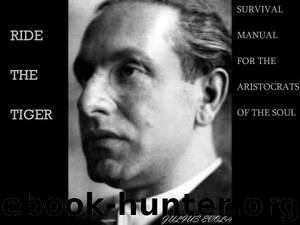Ride the Tiger: Survival Manual for the Aristocrats of the Soul by Julius Evola

Author:Julius Evola
Language: eng
Format: epub
Tags: Ride; Tiger; Survival; Manual; Aristocrats; Soul; Tradition; Traditionalism
There is a further aspect of phenomenology that at least pretends to reflect a traditional view. One is supposed to overcome the antithesis or hiatus that usually exists between the data of direct experience and its
significances. The school in question seeks to distinguish itself both from the irrational and vitalistic, and from the positivistic and empirical schools. What remains in those schools, after they have made a tabula rasa after their fashion, is the simple, "positive," sensible reality (the point of departure for correspondingly "positivist" science), or the pure experience lived as something instinctive, irrational, and subintellectual. In contrast, the disclosure or animation of the phenomenon when the light of the Self, of Being, is projected onto it causes to appear in the phenomenon itself, as its ultimate essence, something one might call "intellectual" (intelligible), if intellectuality did not nowadays mean that which belongs to the rational and abstract mind. One can clarify the idea by saying that what intervenes, beyond the stage of direct experience, certainly, but disanimate and opaque, is a "vision of the sense of things as a presence." "Understanding coincides with vision, intuition (direct perception) with meaning." Whereas normally the world is given us in the form of sensible presences ("phenomena") without significance, or else as merely subjective meanings (ideas of thought) without a sensible presence (without a real intuitive basis), the two things are supposed to coincide in the "phenomenological deepening" on the plane of a higher objectivity. In this way, phenomenology does not present itself as irrationalism or positivism, but as an "eidetics": a knowledge of intellectual essences. It aims toward an "intellectual" transparency of the real, of which naturally there are very different degrees.
When medieval philosophers spoke of intuitio intellectualis (intellectual intuition), they were not referring to anything different. On the whole, and keeping strictly to the essential points that have been raised so far, and to the way in which I have raised them, the assumptions of phenomenology would seem to correspond to those that I have formulated. Nevertheless, such a correspondence between the phenom-enologists' motives and traditional teachings is superficial and illusory, though as I have said, one sometimes wonders whether it is a case of plagiarism pure and simple. The phenomenological school of Husserl and his followers deals with simple philosophy; it is like the parody of things belonging to an absolutely different world. The whole of phenomenology, being the invention of modern thinkers and academic specialists, has as its sole basis the existential plane of modern man, for
146 Dissolution of Consciousness and Relativism
whom the disclosure of phenomena, that is, the concrete, living pluridi-mensionality of the real presented in its nakedness (Nietzsche would say in its "innocence") is and must be mere fancy. Everything in this school is confined to more or less abstruse books, with the usual vain critical examinations of various systems of the history of profane philosophy, with logical analyses and the usual fetishism for "philosophy," not to mention the mixture of the valid motives that I have isolated here with many suspect ideas.
Download
This site does not store any files on its server. We only index and link to content provided by other sites. Please contact the content providers to delete copyright contents if any and email us, we'll remove relevant links or contents immediately.
| Anthropology | Archaeology |
| Philosophy | Politics & Government |
| Social Sciences | Sociology |
| Women's Studies |
Nudge - Improving Decisions about Health, Wealth, and Happiness by Thaler Sunstein(7693)
The Fire Next Time by James Baldwin(5431)
iGen by Jean M. Twenge(5409)
Adulting by Kelly Williams Brown(4566)
The Sports Rules Book by Human Kinetics(4379)
The Hacking of the American Mind by Robert H. Lustig(4375)
The Ethical Slut by Janet W. Hardy(4242)
Captivate by Vanessa Van Edwards(3838)
Mummy Knew by Lisa James(3686)
In a Sunburned Country by Bill Bryson(3537)
The Worm at the Core by Sheldon Solomon(3486)
Ants Among Elephants by Sujatha Gidla(3463)
The 48 laws of power by Robert Greene & Joost Elffers(3254)
Suicide: A Study in Sociology by Emile Durkheim(3019)
The Slow Fix: Solve Problems, Work Smarter, and Live Better In a World Addicted to Speed by Carl Honore(3007)
The Tipping Point by Malcolm Gladwell(2914)
Humans of New York by Brandon Stanton(2868)
Handbook of Forensic Sociology and Psychology by Stephen J. Morewitz & Mark L. Goldstein(2704)
The Happy Hooker by Xaviera Hollander(2686)
